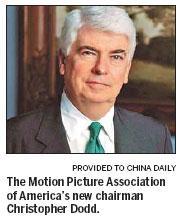Change in film import quota is on the horizon

Chinese audiences are sophisticated enough to choose which movies they want to watch, the Motion Picture Association of America's new chairman Christopher Dodd says.
The former US senator was referring to negotiations between China and the United States over a World Trade Organization (WTO) ruling that urges China to further open its film market.
The government limits imports for theater releases to 20 foreign films a year. Importation rights belong solely to the State-owned China Film Group Corp, which shares exclusive distribution rights with Huaxia Film Distribution Company.
The WTO ruled in August 2009 that China must loosen its restrictions on the distribution of foreign films and rejected the country's appeal four months later. The compliance deadline was set for March 19 this year.
Negotiations are ongoing, and there are rumblings the 20-film cap may be lifted. But Dodd has no news on concrete developments - yet expresses optimism.
"There are meetings early this week," he told China Daily at the Shanghai International Film Festival on Monday.
"(They're) mainly procedure meetings, but I am optimistic that there will be an answer that will be satisfactory regarding the quota and the WTO decision."
News Corporation's chairman Rupert Murdoch used the festival's June 12 summit to call upon China to relax control on foreign films' distribution and on investment in distribution entities.
But Dodd believes the question is greater than the quota and distribution rights.
"I have a tremendous amount of faith in the sophistication and readiness of the Chinese movie-goers," he says.
"The issue goes to the heart of having confidence and trust in your people to make good judgments about good and bad films, (and) not limiting their choices."
In his keynote speech at a festival summit on co-productions, Dodd quotes the title of the 1913 Chinese feature film A Couple in Difficulty to illustrate the relationship between China's and the US' film industries. But he says that comparison isn't complete.
"In the last 10 years, we have seen growth and development that allows me to say ... the Chinese film industry has fully matured," he says.
"So, too, have the relationships between the American film industry and Chinese filmmakers, Chinese audiences and even the Chinese government."
He highlights Sino-US co-productions, which are exempt from the quota.
"China's encouragement of co-production rules have made possible films like Hero, Forbidden Kingdom, The Mummy: Tomb of the Dragon Emperor and The Karate Kid," he says.
"These world-class pictures have appeal to Chinese audiences, American audiences and movie fans the world over."
















